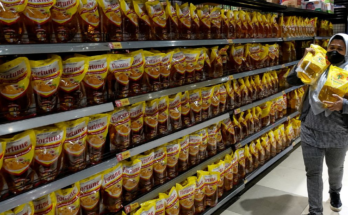An Asian subsidiary of Goldman Sachs will plead guilty to charges in the United States to resolve a foreign corruption and bribery case over the looting of billions of dollars from a Malaysian sovereign wealth fund, according to a person familiar with the agreement.
The Wall Street bank’s parent company will admit mistakes, the person said, but will not itself have to enter a guilty plea as part of the deal with federal prosecutors. The bank will also avoid the appointment of an outside monitor to review its compliance procedures.
The settlement, which also requires the bank to pay more than $2 billion in penalties to the Justice Department and U.S. securities and banking regulators, is scheduled to be formally announced on Thursday morning, according to two people briefed on the plans.
The agreement — negotiated over nearly two years with federal prosecutors in Brooklyn and the kleptocracy division of the Justice Department — ends an investigation into one of the worst scandals in the bank’s long history. But it is a black eye for Goldman, which has never before had to plead guilty in a federal investigation. And a statement of facts to be released with the settlement will put the bank in a poor light, according to two people familiar with the document.
A bank spokeswoman declined to comment. The terms of the guilty plea were first reported by The Wall Street Journal.
The scandal centered on the 1Malaysia Development Berhad fund, known as 1MDB, and spanned the globe. It brought down the government of Malaysia’s prime minister at the time, Najib Razak, and turned a financier with expensive tastes named Jho Low into an international fugitive.
More than $2.7 billion raised for the fund in bond offerings arranged by Goldman financed lavish lifestyles for powerful Malaysians, including friends and family of Mr. Najib. The money bought paintings by van Gogh and Monet, a mega-yacht docked in Bali, a grand piano made of clear acrylic that was given to a supermodel as a gift, and a king’s ransom in jewelry. Pilfered money also financed a boutique hotel in Beverly Hills, a share of the EMI music publishing portfolio and the Hollywood movie “The Wolf of Wall Street.”
All that and more were paid for with money raised by Goldman Sachs, which earned $600 million in fees to arrange the bond sales.
The fraud prompted criminal investigations in Malaysia and the United States.
Federal prosecutors brought charges against two Goldman bankers and Mr. Low, who is believed to be living in China. One of the bankers — Tim Leissner, the husband of the fashion designer and model Kimora Lee Simmons — has pleaded guilty.
In Malaysia, Mr. Najib was ousted as prime minister and charged with corruption. He was convicted last July and sentenced to up to 12 years in prison and fined nearly $50 million, but the sentence was stayed on appeal.
Malaysian prosecutors also brought criminal charges against Goldman and more than a dozen executives. In July, Goldman agreed to pay $2.5 billion to resolve that investigation. Goldman also pledged to cover any shortfall from the sale of $1.4 billion in assets that have been seized by prosecutors in the United States and Malaysia.
Earlier this year, Goldman lobbied the Justice Department seeking to limit the penalties it would face in the United States. The bank asked prosecutors in Washington to consider the amount it would pay to Malaysia when calculating its domestic penalties and sought to avoid a guilty plea by the subsidiary.
All told, the fines and restitution Goldman will pay over 1MDB are more than the $5 billion it paid in 2016 in a civil settlement over its role in marketing and selling faulty mortgage securities to investors in the run-up to the 2008 financial crisis.
A guilty plea by the bank itself could have caused complications for some of its businesses, but that outcome had not been seriously under consideration for months. The ramifications of a subsidiary guilty plea are less serious: In the past, the Securities and Exchange Commission has issued waivers allowing banks in similar situations to operate as normal. And the Department of Labor can grant a waiver to allow a bank to continue as a fiduciary for employee pension and retirement plans.
Goldman has long blamed rogue employees, including Mr. Leissner, a former top partner in Asia that the bank has said acted without approval. He pleaded guilty in 2018, saying that he and others at Goldman had conspired to circumvent the bank’s internal controls, allowing them to work with Mr. Low to bribe Malaysian officials and secure the bond deal.
As part of his plea, Mr. Leissner agreed to forfeit up to $43.7 million and cooperated with the investigation. Another former Goldman banker, Roger Ng, pleaded not guilty and is set to go on trial next year.
U.S. prosecutors also charged Mr. Low, who has never appeared in court to face charges but has denied wrongdoing.
Some within the bank were wary of Mr. Low, a flamboyant businessman who had befriended many Hollywood celebrities and was known for staging wild and extravagant parties in Las Vegas. The bank’s compliance department had rejected him as a client because it was unclear how he had amassed his wealth.
Even so, Mr. Low met in December 2012 with Lloyd C. Blankfein, who at the time was Goldman’s chairman and chief executive, at Goldman’s offices in New York. That was just a few weeks before the bank arranged the third bond deal for 1MDB.
The investigation of Mr. Low and the 1MDB scandal has been a multipronged affair.
On Tuesday, Elliott Broidy, a major fund-raiser for the Trump campaign in 2016, pleaded guilty to conspiring to violate foreign lobbying laws after accepting $9 million from Mr. Low to try to convince the Trump administration to end the 1MDB investigation, and take other steps. Mr. Broidy agreed to forfeit $6.6 million and to cooperate with prosecutors.
And a separate team of federal prosecutors in Los Angeles has been focused largely on recouping assets bought with the stolen funds. Mr. Low agreed last year to relinquish any claim to more than $900 million in assets that had been seized by the federal government, with much of those proceeds going back to Malaysia.
Kenneth P. Vogel and Nicole Hong contributed reporting.



